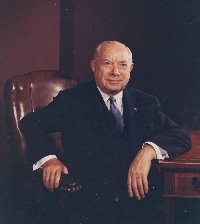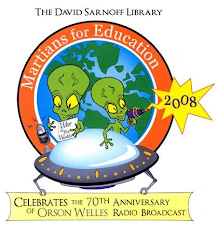Aaron Sorkin's Broadway play The Farnsworth Invention closed last weekend after a three-month run at the The Music Box Theatre. According to Variety, its box office suffered from the strike last fall that began on opening night, and competition from a number of other non-musical productions. Thanks to the gift of Library friend George Cody, I had the opportunity to see it before it closed, and offer these thoughts as a reflection on the power of fact and fiction to make us think about the people and ideals behind our material world.
Having spoken with Sorkin's assistant at length, provided David Sarnoff actor Hank Azaria with a bibliography, read the script, and read and heard a great many reviews, I took my seat with some trepidation. Yet there on the scrim concealing the stage were projections of Philo Farnsworth's patent and notes for his image dissector. How odd is that for a theatre district that lives on musical spectaculars? When the play opens, there's the smartly dressed Sarnoff as characterized by Sorkin and Azaria--direct, aggressive, idealistic--introducing the subject, the invention of television, and the protagonist, Farnsworth, as a schoolboy in rural Idaho.
And off we go, from an untutored genius in a remote one-room schoolhouse to Sarnoff's escape from Russian pogroms to his perceptive understanding of the power of radio broadcasting and the rise of RCA in the 1920s. While Farnsworth pluckily cobbles together a team of family members to help him demonstrate the first public electronic TV transmission (Vladimir Zworykin made an internal demo of his electronic system in 1925), Sarnoff engineers RCA's growth into a multimedia empire, only to see it collapse in the speculative Crash of '29. This certainly resonated with an audience all too aware of reverberations of the bursting subprime bubble.
My concerns turned to from relief to pleasure and then joy as I watched the cast recreate the spirit of creativity, wonder, competition, and disillusionment in high technology. Sorkin, director Des McAnuff, and the rest of the ensemble created an alternate universe in which they realized a Sarnoff different in shape and manner from the one that I and the Sarnoff family and older RCA staff know. But not in his essence: there they’ve caught and manifested David’s understanding of the power and possibility of communications, a conviction he maintained from the questionable quality of radio programs to the televised riots and warfare of the 1960s—because he knew we have no choice. Some may feel that the final scene doesn't fit: a bar whose patrons are riveted by the televised moon landing (how the camera beat the lander to the surface requires some suspension of disbelief). But it caps the story with the ideal use that Sarnoff and Farnsworth hoped for "their" invention: the sight of the moon's vast wasteland justifies the landscape broadcast by the commercial networks.
The flaws with the play are not in Sorkin's mash-up of history and fiction, or the amount of information he pours out through his narrators and characters. They appear in the effort to make a tragedy out of a conflict between an inventor and an innovator. There are lots of brilliant inventors, but many of their inventions or patents never make it to the factory or the consumer, because of technical drawbacks, someone's else better idea, the lack of entrepreneurial support, the wrong market, or the wrong cultural moment for the right market. There are arguably fewer brilliant entrepreneurs, who have a vision, a place for particular inventions and products within that vision, and a sense of what the right market will bear. And here, that innovator is a force of nature few of us can comprehend, because he is not only single-minded but also correct about the future of communications, again and again and again. Sarnoff invariably "wins" because as innovator he commands the financial and intellectual resources to take the best inventions and organize the groups necessary to turn them from paper ideas into a popular commercial product.
So is that a tragedy, and what do we make of the title? Jimmi Simpson, who played Farnsworth, was equal to the challenge of maintaining his character's near-manic drive, his optimism, and his disillusionment when he understands the inherent flaw in the camera he invented. He held his own in his encounters with Azaria's Sarnoff; more than that we see how untutored, and consequently unfocused, this genius was. It's hard to imagine a better case for nurturing the brilliant young people in our cities and our countryside than seeing young Philo trying to explain his image dissector to his ninth-grade teacher, sell his idea to a couple of traveling salesmen with some savings, and fix the unfixable in his clever but flawed TV camera.
None of this has much to do with Sarnoff, but an audience unconsciously expecting the tragic bioplay of a lone inventor finds him matched if not overshadowed by the corporate visionary and innovator. Azaria did his job all too well in filling Sarnoff's shoes. He was ambitious and commanding in the service of a noble cause, and he was also human, with a wife who knows how to take him down a peg when necessary. Without a David Sarnoff we can identify with as well as wonder at, there is no dramatic tension, no story in which an audience may ponder the wonder of our inventiveness, the ambitions and unfairness of life, the meaning of our achievements.
It's not called the The Sarnoff Innovation but it might as well be, given the RCA leader’s taking on the government and the rest of the broadcast and electronics industries to bring electronic TV to the American household, for better and worse. That story may never have the dramatic tension that Sorkin creates, at least not until Peter Sellars writes the opera. Until then Sorkin leaves us wondering whether TV is Farnsworth's invention after all.
Thursday, March 06, 2008
Farewell to The Farnsworth Invention?
Labels:
Aaron Sorkin,
David Sarnoff,
Farnsworth,
Farnsworth Invention,
Hank Azaria,
History,
RCA,
Television,
Zworykin
Subscribe to:
Post Comments (Atom)


No comments:
Post a Comment